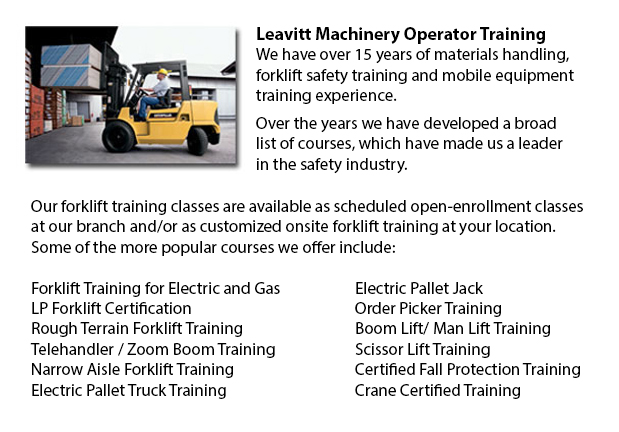
Nanaimo Forklift Certification Schools - Within North America, forklift certification is mandatory, making forklift training programs essential for both the company and their workers working as operators of forklifts. Forklift training focuses on safety and health concerns included in using forklifts. Safety issues affect both the driver of the forklift and employees and other people who are near the forklift. Businesses might be subject to penalties if they are caught with operators who are not certified during an inspection. There are numerous convincing reasons why businesses have to abide by forklift standards.
Before the employee or trainee is certified to drive a forklift, nearly all provincial, federal and state rules will need the worker go through an evaluation of the skills essential for forklift safety. There are numerous forklift certification schools providing courses for employees and there are also schools that offer online forklift training. Then again, employers must know that forklift certification training is not "just a test". Right forklift training must consist of various fields of study, such as theory and hands-on practice. Rules do not need employers to have an outside organization to certify forklift drivers.
A quality forklift certification school would include a recommended curriculum that involves classroom training and hands-on training that is performed on-site. The training sessions within the classroom include power point presentations, videos, models and discussions. Students usually must write a test to check for comprehension of subject matter. Certificates of completion are given upon successfully finishing the class.
An evaluation of the student's use of the equipment consists of pre-operational equipment inspections, knowledge of job site hazards, a pass/fail operational test and operational instruction.
Training typically covers the following subject areas: Controls & Instrumentations; Understanding legislations and regulations; maneuvering and Steering; Engine Operation and Maintenance; Visibility, Fork & Attachment Restrictions; Stability, Rated Capacities, Inspection & Maintenance; Load Control; Refueling; Pedestrians, and Hazardous Places & Rough Terrain Operation. There are likewise training courses offered for employees who are transitioning to new job positions.
-
Nanaimo Boom Lift Certification
Nanaimo Boom Lift Certification - Using elevated work platforms allow for maintenance operations and work to be carried out at elevated work heights which were otherwise not reachable. Workers making use of scissor lifts and boom lifts can learn how... More -
Nanaimo Boom Lift Safety Training
Nanaimo Boom Lift Safey Training - Boom lifts are a kind of aerial lifting device or elevated work platform which are commonly used in industry, warehousing and construction. Boom lifts could be utilized in practically whichever environment because o... More -
Nanaimo Loader Operator Training
Nanaimo Loader Operator Training - Loader Operator Training - Forklift training is a prerequisite within North America and is intended to prevent workplace death and injuries. Lift truck training provides driver training intended for forklift operato... More -
Fall Protection Certification in Nanaimo
There are high numbers of injuries at work associated to falling and lots of fall-related deaths reported each and every year. Most of these instances might have been prevented with better training, better measures in place, and by properly equipping... More -
Nanaimo Crane Ticket
Nanaimo Crane Ticket - The modern version of a crane can be either complex or simple, and cranes vary based on their use. Mobile cranes, for example are rather simple. A telescopic boom or steel truss mounts its movable platform. A system of levers o... More -
Operator Safety Certification | Re-Qualification Certification | In-House Instructor Certification in Nanaimo
Lift trucks are used in practically all industrial construction sites and in warehouse operations and in boat yards. The reach feature of a forklift is a very important part utilized in several applications like when a shelving system is being used t... More -
Aerial Lift / Boom Lift / Man Lift / Scissor Lift Certification in Nanaimo
Scissor hoists are lift tables which lift up materials and individuals and supplies vertically. They are normally used in construction, commercial and industrial environments. A common use of scissor hoists is for lowering or lifting construction sup... More -
Crane / Overhead Crane / Self-Erect Crane / Truck Mounted Crane / Hydraulic Cranes Certification in Nanaimo
Bridge cranes or likewise called overhead cranes are a type of industrial material handling crane utilizing a line and hook apparatus that runs on a horizontal beam running along two widely separated rails. Several overhead cranes can be seen inside... More

Forklift Certification Nanaimo
TOLL FREE: 1-888-254-6157
Nanaimo, British Columbia
forkliftcertificationnanaimo.com
Email Us
About Us


